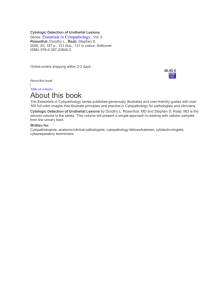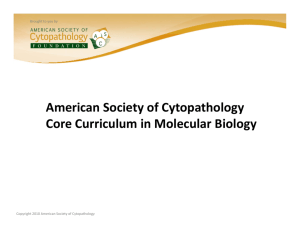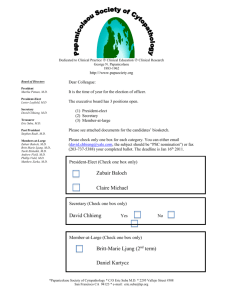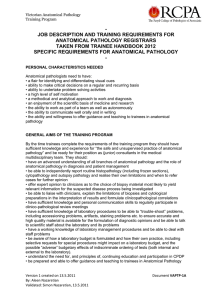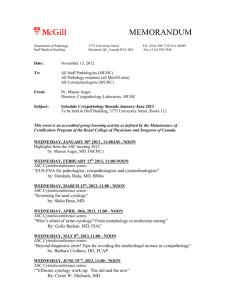Post-Fellowship Diploma in Cytopathology TRAINEE HANDBOOK 2016
advertisement
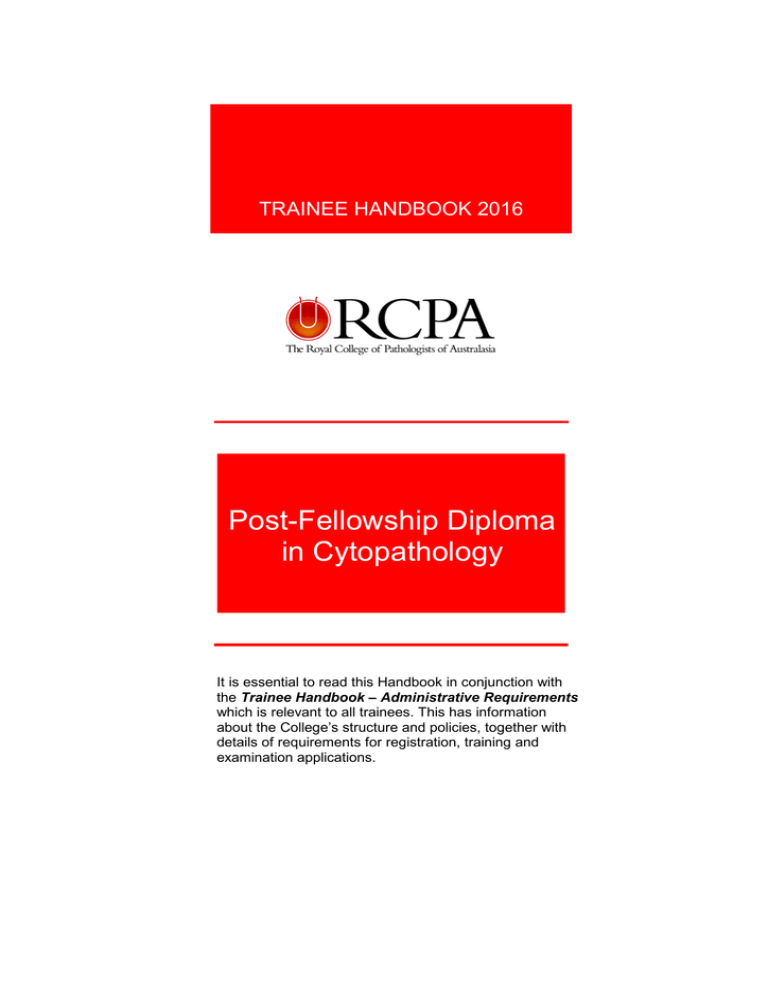
TRAINEE HANDBOOK 2016 Post-Fellowship Diploma in Cytopathology It is essential to read this Handbook in conjunction with the Trainee Handbook – Administrative Requirements which is relevant to all trainees. This has information about the College’s structure and policies, together with details of requirements for registration, training and examination applications. Trainee Handbook - Post-Fellowship Diploma in Cytopathology INTRODUCTION The College offers a post-Fellowship Diploma in Cytopathology (Dip.Cytopath.) for Fellows who have successfully completed the Part II Anatomical Pathology or Haematology examinations, or final General Pathology examinations. AIMS OF THE DIPLOMA The aims of the Diploma in Cytopathology are to: 1. Certify professional expertise in Cytopathology 2. Allow Fellows whose practice includes a substantial component of Cytopathology to demonstrate further expertise in Cytopathology. TRAINING The Diploma course of training includes the following: Twelve months equivalent full time experience in an institution approved by the RCPA Board of Education and Assessment for training in Cytopathology. This could include specialised Anatomical Pathology departments with a major service in exfoliative and fine-needle aspiration Cytopathology and with an identifiable Cytopathology laboratory; either full or part-time training, provided that part-time training is equivalent in aggregate to 12 months full-time training. Consideration may be given to a period of pre-Fellowship training specifically in Cytopathology; the reporting out of at least 1000 general (non-gynaecological) cases, 300 fine-needle aspirates and 2000 gynaecological cases, the latter to be of the type that would ordinarily be referred to a Cytopathologist. Fellows who have completed the required 12-months experience are eligible for immediate award of the Diploma on successful completion of the examination. For those who take the examination part-way during this period, award of the Diploma is deferred until the requisite 12 months experience is complete. ASSESSMENT The Diploma examination will have written, practical and oral components, including: - a three-hour written specialised examination in Cytopathology - the presentation of a Casebook detailing 10 Cytopathology cases handled personally by the candidate - A practical examination consisting of 15 to 20 Cytopathology slides - an oral examination. The written and oral examinations are held at the same time as the Part II examinations in Anatomical Pathology. T H E C AS E B OOK Each of the 10 cases detailed in the Casebook must include the history, cytological findings including the use of ancillary techniques where appropriate, and a review of the relevant literature. Repetition must be avoided, and the cases must encompass a selection of both gynaecological and non-gynaecological disorders, and tumours and non-neoplastic lesions. © January 2016 The Royal College of Pathologists of Australasia Page 1 of 3 Trainee Handbook - Post-Fellowship Diploma in Cytopathology Fellows may submit publications of direct relevance to Cytopathology in lieu of the Casebook. These include books, book chapters or articles in peer-reviewed journals. Individual case reports in peer-reviewed journals are also acceptable with each case report equal to one case in the Casebook. Other more substantial publications will be weighed appropriately in comparison to individual cases. As a general guide, about three to five substantive publications could secure a Casebook exemption, but each application will be decided on its merits by the Board of Education and Assessment.. Guidelines for presentation, certification and submission are similar to those for the Part II Anatomical Pathology Examination Pathology (see under Anatomical Pathology Requirements). L I M I T E D E X AM I N AT I ON FOR C Y T OP AT H OLOGY D I P LOM A At its discretion, with the exception of the oral component, the Board of Education and Assessment may waive any part of the examination depending on the candidate’s qualifications and experience. G U I D E LI N E S FOR ‘O R AL O N LY ’ E X AM I N AT I ON C Y T OP AT H OLOGY FOR T H E D I P LOM A IN On the recommendation of the Chief Examiner in Anatomical Pathology, in consultation with the RCPA’s Cytopathology Advisory Committee Chairman, approval may be given for an oral examination only. Applicants for an oral examination only should be nominated by a College Fellow, or the Head of the Department or another pathologist of equivalent status from the department in which they work. The applicant should: be a Fellow of the RCPA; and have substantial full time experience as a specialist in Cytopathology (eg full or part-time experience as a specialist in Anatomical or General Pathology, and Cytopathology amounting to > 10 years in aggregate, of which > 5 years shall be in Cytopathology); or have significant experience in a senior administrative or academic post with a substantial professional component in Cytopathology (eg full or part-time experience as a specialist in Anatomical or General Pathology, and Cytopathology amounting to > 10 years in aggregate, of which > 5 years shall be in Cytopathology). Fellows with less than a total of 10 years’ specialty, senior academic or administrative experience are unlikely to be approved unless there are exceptional circumstances. In this situation, the applicant and sponsor should detail why they believe an exception may be justifiable. Approval for the oral only form of examination is most likely for those Fellows who fulfil at least one and preferably several of the following criteria. That they: have a national and international reputation among peers for excellence in Cytopathology; are a major contributor to Cytopathology through publications (books; book chapters; or papers published in peer-refereed journals); or have presented or given invited lectures at national and international scientific meetings. Candidates with fewer than 20-30 publications or presentations are unlikely to be successful; are members of national or international committees related to Cytopathology; © January 2016 The Royal College of Pathologists of Australasia Page 2 of 3 Trainee Handbook - Post-Fellowship Diploma in Cytopathology substantially contribute to professional organisations such as learned Colleges in Cytopathology; consult or advise government, academic or professional bodies in Cytopathology; have national or international awards recognising research achievements or professional excellence, or for other contributions in Cytopathology. Applicants and their sponsors should address these selection criteria in their applications, and may request for one or more of these criteria to be weighted. The RCPA Board of Education and Assessment may give each application, the applicant's curriculum vitae, and any supporting documents to up to three referees. Because referee reports may take time, the Fellows and their sponsors should send applications well in advance of the examination application closing date, which is the last working day in February each year. At its discretion, the Board of Education and Assessment may vary any of the above guidelines depending on the circumstances and merits of a particular case. G U I D E LI N E S F OR E X E M P T I ON O F W R I T T E N E X AM I N AT I ON O R C AS E B OOK F OR T H E D I P LOM A I N C Y T OP AT H OLOGY On the recommendation of the Chief Examiner in Anatomical Pathology, in consultation with the RCPA’s Cytopathology Advisory Committee Chairman, approval may be given for some candidates, eg, pathologists whose professional attainments and experience in Cytopathology do not meet the requirements for award of the Diploma by oral examination only – to be exempted from the written or Casebook components of the examination (or both). Applicants requesting this form of examination should be nominated by a College Fellow, or the Head of the Department or another pathologist of equivalent status from the department in which they work. The applicant should: be a Fellow of the RCPA; and have substantial full time experience as a specialist in Cytopathology (eg full or part-time experience as a specialist in Anatomical or General Pathology, and Cytopathology, amounting to 5 to 10 years in aggregate, of which >3 years shall be in Cytopathology Applications from candidates with less experience are unlikely to be approved unless there are exceptional circumstances. In this situation, the applicant and sponsor should detail why they believe an exception may be justifiable. At its discretion, the Board of Education and Assessment may vary any of the above guidelines depending on the circumstances and merits of a particular case. © January 2016 The Royal College of Pathologists of Australasia Page 3 of 3
